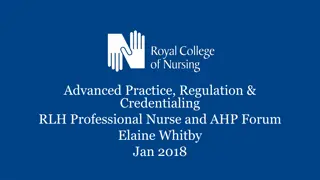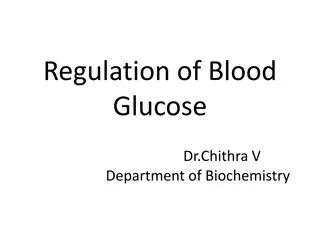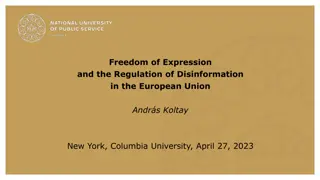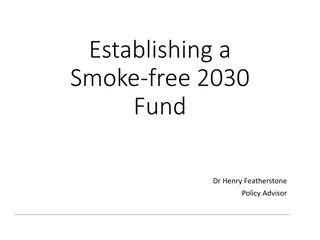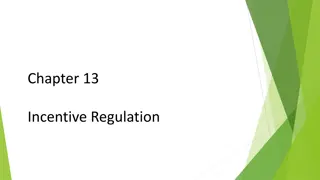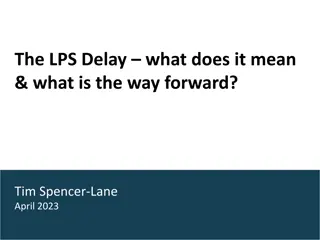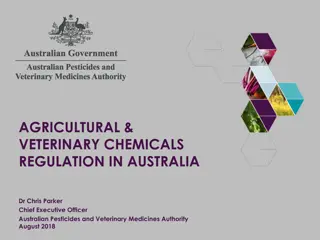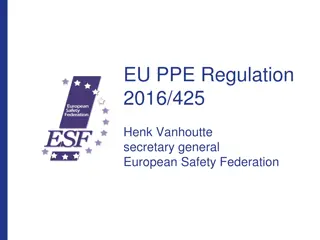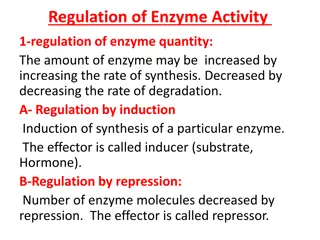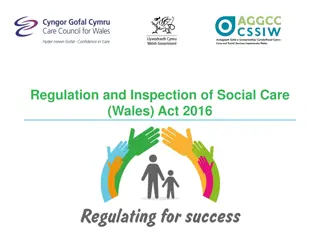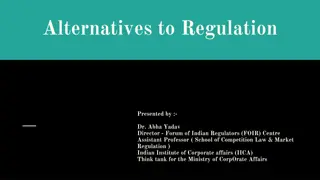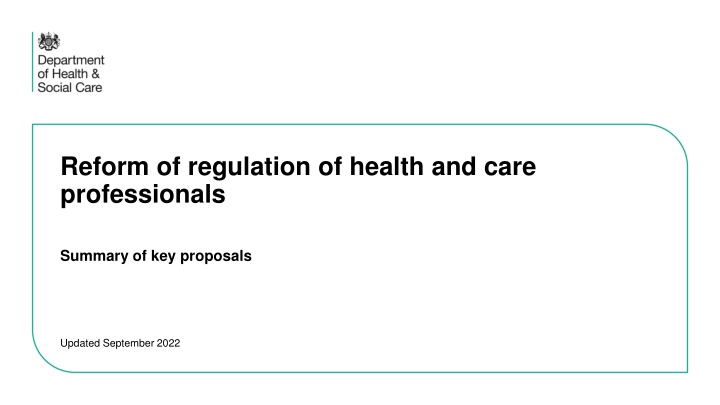
Key Proposals for Reforming Health and Care Professional Regulation
"Learn about the key proposals for reforming the regulation of health and care professionals, aimed at enhancing public safety, protecting registrants' rights, and delivering more efficient and responsive regulation. The reforms focus on governance, education, training, and improving the fitness to practice processes."
Download Presentation

Please find below an Image/Link to download the presentation.
The content on the website is provided AS IS for your information and personal use only. It may not be sold, licensed, or shared on other websites without obtaining consent from the author. If you encounter any issues during the download, it is possible that the publisher has removed the file from their server.
You are allowed to download the files provided on this website for personal or commercial use, subject to the condition that they are used lawfully. All files are the property of their respective owners.
The content on the website is provided AS IS for your information and personal use only. It may not be sold, licensed, or shared on other websites without obtaining consent from the author.
E N D
Presentation Transcript
Reform of regulation of health and care professionals Summary of key proposals Updated September 2022
Reform of regulation of health and care professionals What is professional regulation? Professional regulation is in place to protect the public from the risks of poor practice by health and care professionals by ensuring professionals work to minimum standards of care for safe and effective practice. Aim of reform programme To deliver modern and efficient fitness to practise processes, better supported healthcare professionals, and more responsive and accountable regulation. Overarching principles: o public safety is the purpose of professional regulation o registrants rights must be protected o the legislative framework should set out regulators high-level duties and powers, and the outcomes they should deliver, but leave regulators to determine how those duties and powers are fulfilled o regulators should have broadly equivalent powers o regulators should have greater autonomy to set out their own operating processes and procedures o overly prescriptive legislation should be repealed or revoked
General Approach Programme to modernise the professional regulation framework for health and care professionals through a series of secondary legislation (Section 60) Orders. The programme takes in to account the reforms recommended by the Law Commission which aimed to consolidate and simplify the existing legal framework and introduce greater consistency across the regulatory bodies. There are also a number of reports that have been published in recent years which have had a bearing on our proposals, such as the Francis and Paterson inquiries and the Williams, Kirkup and Cumberlege reviews. We will start with legislation for the GMC, which will bring Anaesthesia Associates and Physician Associates into regulation under the new reforms. This will be followed by further legislative changes to extend these power to medical practitioners and to the other regulators. 3
The four key areas of reform 1. Governanceand Operating Framework o Regulators will have greater freedom to make changes to their operational procedures through rules o This greater autonomy will be balanced with strengthened governance arrangements to ensure appropriate oversight and accountability. 2. Education and Training o Regulators will be provided with flexible powers to carry out their education and training function effectively and efficiently, and to rapidly adapt their processes to reflect future workforce changes. o These powers will include: o setting education and training standards; o approving qualifications and providers; and o setting examinations or assessments. o The powers will allow regulators to approve courses or institutions outside the UK. 4
3. Fitness to Practise Regulators will have a fitness to practise process that is swifter, fairer and less adversarial which will benefit all parties involved in fitness to practise proceedings and, most importantly, will ensure expedient public protection where needed. The proposed changes will allow decisions to be made more quickly, providing early resolution for patients, families and professionals, and ensuring that the steps necessary to protect the public are in place sooner. Reform measures include: o a three-stage fitness to practise process including an initial assessment, a case examiner stage and a Fitness to Practise panel stage. o a broad range of measures (warnings, conditions, suspension orders and removal orders) which will be available to both case examiners and Fitness to Practise panels to help ensure that restrictions to practice are proportionate and appropriate. o more cases will be resolved without the need for a fitness to practise panel hearing by introducing accepted outcome decisions made by case examiners. o regulators will be provided with a consistent set of powers relating to interim measures and have the same grounds for action. o automatic removal orders will reduce the administrative burden on a regulator to find impairment where a registrant has been convicted of certain serious criminal offences. o removal of the five-year rule restriction on regulators being able to consider concerns more than five years after they came to light.
Fitness to Practise Appeals Appeal rights will apply where: a case examiner has found a registrant s fitness to practise to be impaired and has imposed a measure due to a non-responding registrant; a case examiner has found a registrant s fitness to practise to be impaired, and a registrant has accepted the proposed outcome and measure; a Fitness to Practise panel has found a registrant s fitness to practise to be impaired and has imposed a measure; an Interim Measures panel has imposed a measure; and registrants will have the right to appeal decisions by a Fitness to Practise panel or Interim Measures panel to the High Court in England and Wales, the Court of Session in Scotland, or the High Court in Northern Ireland.
4. Registration We will provide regulators with simpler, flexible registration powers o Regulators will have greater flexibility to set out their own processes and procedures in relation to registration through rules or guidance, rather than these being fixed in legislation. o Regulators will be required to set the standards of education, training, knowledge, skills, experience, conduct, performance, ethics, English language and have a power to determine any additional requirements for registration. o Regulators will be required to establish processes for the on-going assurance of professionals on their register. Regulators will be given powers to determine the standards relevant to this process. o Regulators will be able to establish different categories of registration set conditions on the scope of practice of groups of registrants who fulfil criteria as determined by regulators e.g. provisional registration o Regulators will be able to annotate the register to reflect requirements set out in other provisions or legislation. o These flexibilities are intended to support a range of approaches to registration and enable regulators to flex their process to reflect changes to the healthcare workforce.
Appeals Revisions Appeals Model Some examples of variations to the model: No right of appeal for decisions relating to persons registered under the emergency provisions. No right of appeal where a person has failed to apply for registration in accordance with Regulator rules. No right of appeal against a decision where it relates solely to the non-payment of a fee in accordance with rules. Automatic removal for a listed offence follows a different process. The model for appeals has now been simplified into a four-stage process based on Regulators feedback: Initial decision a Revisited by first decision maker/regulator b Changed by an internal appeal panel c Changed by court d Regulators must make rules about the constitution of a Panel.
Next Steps We are planning to publish the Government response to the 2021 Regulating Healthcare Professionals, Protecting the Public Consultation later this year. The Anaesthesia Associates and Physician Associates Order (AAPAO) is undergoing formal legal checks ahead of a three month consultation on the draft legislation in commencing Autumn 2022. We expect the legislation to be laid in the second half of next year. Building on the AAPAO as template, we will then bring forward further legislation to introduce these changes to all healthcare professional regulators and all regulated healthcare professions. We recognise that some regulators will require specific provisions to be drafted to reflect specific functions or issues (e.g. where the also regulate businesses or premises, title protection). We will set out the timetable and sequence for these reforms in due course. Our expectation is that we will be able to progress multiple regulators at the same time. Once each regulators new legislation is developed, it will need to produce and consult on a complete set of rules, which set out the detail on how they will regulate their profession(s) using the new powers.






